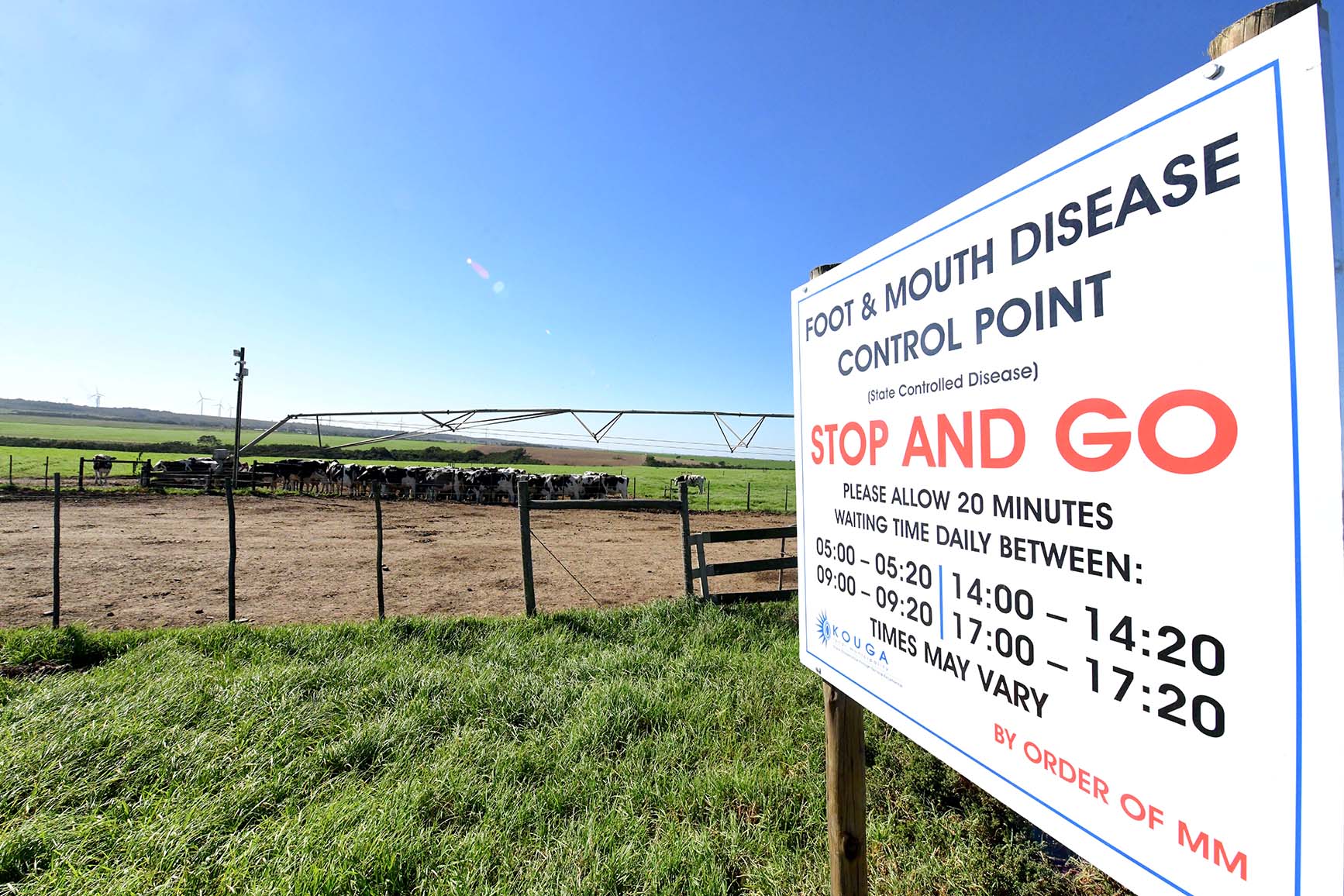Two new cases of foot-and-mouth disease (FMD) have been discovered in Mpumalanga and Gauteng, this follows multiple cases of the virus in KwaZulu-Natal. The Department of Agriculture has announced that a farm in Mpumalanga that was identified as part of trace-forward exercises has a case stemming from an auction in Utrecht, KwaZulu Natal.
Although these animals showed no clinical signs of disease, further investigations have confirmed that the virus has spread to adjacent camps on the same farm.
There are no indications that other farms have become infected, but veterinary services are continuing with clinical inspection and testing of livestock on farms in the area. Another case was reported at a farm in Gauteng.
In a statement the department said: “Clinical signs suspicious of FMD were noted in a feedlot that received animals from an auction in Heidelberg; samples were collected and prioritised for testing. Laboratory results for these samples are positive and confirmed that this is the same virus that is circulating in parts of KwaZulu-Natal. An epidemiological investigation is under way to trace back and trace forward all other animals that were bought and sold at the same auction.”
Leon Hiestermann, who chairs the Mpumalanga Red Meat Producers’ Organisation, says they are engaging all relevant stakeholders to ensure the disease does not spread in Mpumalanga province.
In a conversation with Daily Maverick, he commended state veterinarians in the province and said all hands were on deck to prevent the spread of the virus.
“We are busy with roleplayers like state veterinarians, we have weekly meetings just to know where we stand and what’s happening. All farms have been tested and it’s just the one farm that is momentarily positive. It seems like the adjacent farms are not positive at the moment, but we are working together with organised agriculture in the form of Mpumalanga Agri, the private sector and Red Meat Industry Services. Everybody is putting their hands together and monitoring,” said Hiestermann.
Read more: Steenhuisen ups ante on biosecurity, demands immediate action to curb spread of foot-and-mouth disease
Hiestermann said they had had a case on the KwaZulu-Natal border where they used digital surveillance to track cattle that had been turned back to avoid transporting stock that was possibly contaminated.
“We have good veterinary services in Mpumalanga, and that has helped even though they don’t have enough manpower. The South African Police Service is also collaborating with us,” said Hiestermann.
As a result of the spread of the KZN outbreaks to Mpumalanga and Gauteng, China has suspended imports of beef and related products. The Department of Agriculture and Rural Development has confirmed that this suspension is for beef from the whole of South Africa.
Hiestermann said this would affect prices negatively, but they would only know how much in about a week.
“We are still awaiting the effects; we will probably feel it in the prices we will see at auctions. You never know in an uncertain time — the ban could be lifted next week, as we have seen in other cases.’
The statement says that Minister of Agriculture John Steenhuisen has escalated control efforts to the Deputy Director-General’s office due to the seriousness of the matter.
“The office of the Deputy Director-General has already held meetings with Veterinary Services and industry representatives to detail the actions required to curb this threat. The biosecurity, traceability and record keeping of animals bought and sold at auctions and similar industries were raised as a specific concern,” the statement read.
Stern warning
The department cautioned livestock owners in the country to take note of the incubation period of foot-and-mouth disease.
“This is a period of two to 14 days, within which animals can appear clinically healthy, before they start showing clinical signs generally associated with foot-and-mouth disease. This highlights the importance of keeping newly bought animals separated from the resident herd for at least 28 days, even if a health attestation was issued for the animals. The health attestation and 28-day separation have been a legal requirement since October 2022.”
The department urged all livestock farmers to limit animal movement as far as possible.
“We request auctioneers and livestock owners to be vigilant when buying cloven-hoofed animals from provinces where there are active foot-and-mouth disease outbreaks. No cloven-hoofed animals should be accepted from areas under restriction for foot-and-mouth disease in KwaZulu-Natal, Eastern Cape, Limpopo, and Mpumalanga,” it said. DM





